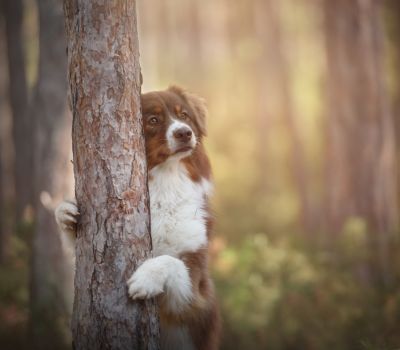It’s not uncommon for dogs to have curious noses that lead them to all sorts of interesting things. Much to many owners’ dismay, it is likely that their dogs will come across rabbit poop, cat poop, and deer poop . Whether you live in a rural area or enjoy outdoor activities with your furry companion, encounters with deer poop can happen more frequently than you might think. In this article, we’ll explore whether deer poop poses a danger to dogs and what steps you should take if your canine friend indulges in this unappetizing delicacy.

Is Deer Poop Dangerous for Dogs?
While deer poop itself may not be inherently toxic to dogs, it can harbor certain parasites and bacteria that could pose health risks. These organisms can vary depending on the region and the specific health of the deer population. It’s important to be aware of the potential dangers and understand the factors that can influence how dangerous ingesting deer poop might be for your dog.
How Might Deer Poop It Affect Dogs?
Deer poop can contain various parasites, including roundworms and tapeworms, which may infect dogs upon ingestion. These parasites can cause a range of symptoms.1 In severe cases, even obstruction of the digestive tract can occur. Additionally, deer feces can harbor bacteria like Salmonella and E. coli, which may lead to gastrointestinal infections in dogs. These infections can manifest as vomiting, diarrhea, lethargy, and loss of appetite.
The danger posed by ingested deer poop can vary based on several factors, including the overall health and immune system of the dog, the specific parasites or bacteria present, and the quantity of deer poop consumed. Puppies, elderly dogs, and those with weakened immune systems are generally more susceptible to the potential health risks associated with ingesting deer poop.
Symptoms of Sickness
If your dog has consumed deer poop, it’s crucial to be vigilant for the following symptoms that may indicate sickness:
- Vomiting: Keep an eye out for episodes of regurgitation or the forceful expulsion of stomach contents through the mouth. Vomiting can occur shortly after ingesting deer poop and may be accompanied by retching or abdominal contractions.
- Diarrhea: Look for loose, watery, or unformed stools that occur more frequently than usual. Diarrhea is a common symptom when a dog’s digestive system is disturbed, and it can be a sign of gastrointestinal upset caused by ingesting deer poop.
- Abdominal discomfort: Observe your dog for signs of abdominal pain or discomfort, which may manifest as restlessness, pacing, whining, or a hunched posture. Dogs experiencing discomfort in their abdomen may exhibit behaviors such as repeatedly looking at or licking their belly.
- Lethargy: Keep an eye out for a significant decrease in your dog’s energy level or overall activity. Lethargy is a general term used to describe a state of tiredness, sluggishness, or lack of interest in usual activities. Dogs affected by ingested deer poop may appear more tired or less enthusiastic than usual.
- Loss of appetite: Monitor your dog’s food consumption and look for a sudden or prolonged decrease in their interest in eating. A loss of appetite can be an indication that something is amiss in your dog’s gastrointestinal system, potentially linked to the ingestion of deer poop.
- Weight loss: Pay attention to any noticeable and unintended weight loss in your dog. While weight loss can be attributed to various factors, if your dog has consumed deer poop and exhibits other symptoms mentioned here, it could be a cause for concern.
- Unusual changes in behavior: Keep an eye out for any atypical behaviors or changes in your dog’s usual temperament or habits. These changes may include increased irritability, aggression, excessive licking or scratching, or any other abnormal behaviors that seem out of character.
Remember, if you notice any of these symptoms or any other concerning signs in your dog after they have ingested deer poop, it’s crucial to take prompt action. Contact your veterinarian to discuss the situation and seek their professional advice to ensure your dog’s well-being.
What to Do if Your Dog May Be Affected and When to Contact a Professional
If you suspect your dog has ingested deer poop and is displaying any concerning symptoms, it’s advisable to consult your veterinarian. They can assess your dog’s condition and provide appropriate guidance. In some cases, the vet may recommend diagnostic tests to identify potential parasites or bacterial infections. Timely intervention can help prevent complications and ensure your dog receives the necessary treatment.
Dogs Eating Deer Poop: What to Remember
Encounters between dogs and deer poop are not uncommon, especially in outdoor settings or areas with a high deer population. While deer poop itself may not be inherently dangerous, it can carry parasites and bacteria that could pose health risks to your furry friend. Understanding the potential dangers, keeping a watchful eye for symptoms, and seeking veterinary assistance when necessary are crucial steps to ensure your dog’s well-being. Remember, prevention is always better than cure, so do your best to discourage your canine companion from indulging in this less-than-appetizing habit.
Citations
TRANSMISSION OF NEOSPORA CANINUM BETWEEN WILD AND DOMESTIC ANIMALS, (2004).
https://meridian.allenpress.com/
Frequently Asked Questions
-
Yes, dogs can contract parasites such as roundworms and tapeworms from ingesting deer poop.
-
Symptoms can vary, but they may appear within a few days to a couple of weeks after ingestion.
-
To prevent your dog from eating deer poop, try keeping them on a leash during walks, training them to “leave it,” and ensuring a clean yard free from deer droppings.
-
In most cases, prompt veterinary care can help prevent long-term health effects. However, complications can arise if untreated infections or infestations persist, so it’s important to seek professional advice if your dog has consumed deer poop.

